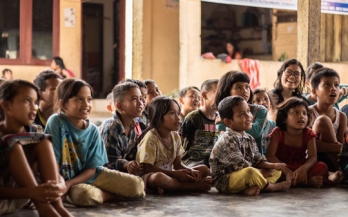The department of Paediatrics and Child Health, Aga Khan University conducted the Pakistan National Nutrition Survey in 2011 to assess the population nutritional status, particularly among women and children using standard international parameters and indicators. This survey report describes the results of these additional analyses.
In support of the state government of Rajasthan and the Indian Integrated Child Development Services, the Global Alliance for Improved Nutrition (GAIN) launched a project to pilot a production model for producing supplementary nutrition via self-help groups.
Eight in ten female readymade garment (RMG) workers in Bangladesh suffer from anemia, a condition which damages both health and productivity. This study evaluated the effectiveness of a workplace nutrition program on anemia reduction in female RMG workers of Bangladesh.
Despite significant advances in the reduction of undernutrition, the population of Tajikistan is still affected by iron deficiency anaemia, neural tube defects and other conditions caused by micronutrient deficiencies. This report presents the findings from a laboratory assessment that was undertaken to evaluate the capacity and capability of relevant food laboratories in Tajikistan to analyse premixes and fortified food.
This situation analysis report presents an overview of the current practices in food and day-care-service provision in 15 ready-made garment factories in Bangladesh. It is part of the operational research for the project, "Improving Nutrition of Female Garment Industry Workers and Their Children in Bangladesh.
Given the widespread deficiency of zinc in Bangladesh, and the lack of national prevention programs, this study focused specifically on increasing the zinc content of the rice grain. The findings from this report suggest that there is a portfolio of options that can and should be considered as part of an agriculture-nutrition strategy in Bangladesh.
This report aimed to quantitatively assess the level of iodine in salt consumed by households in Senegal to provide information on progress made in improving access to iodized salt quality of households following interventions implemented under the Universal Salt Iodization program.
As part of a GAIN funded project on the fortification of cottonseed oil with vitamin A, a baseline study was conducted in Mali to determine the level of retinol serum in the target groups: children aged between 24-59 months and non-pregnant women but of reproductive age.
Vitamin A deficiency remains a leading cause of morbidity and mortality in Indonesian children and women. As a pre-post evaluation, this study assessed consumption of fortified oil, changes in vitamin A intake and retinol status in 2 surveys of women and children.
This report covers evidence of the estimated cost of wheat flour fortification in Tajikistan and suggests a clear economic case for moving forward to fortify flour in Tajikistan with essential micronutrients.










